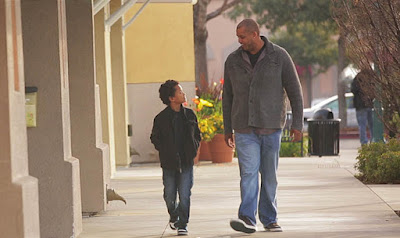That's right: slasher film and gay romantic comedy. And if the resulting combo -- YOU'RE KILLING ME -- seems a tad uneasily joined, well, don't be too surprised. This sometimes quite clever satire of today's online gay culture and behavior also wants to rub our noses in blood and guts, which rather runs counter to the rom-com genre. While this could work, in theory, as practiced by director and co-writer, Jim Hansen (with the helped of his co-writer and co-starring actor, Jeffrey Self, who plays and very well, the lovelorn hero), the finished film is a too-uneasy mix of gore and goofy charm.
Occasionally (very occasionally), Mr. Hansen, shown at left, takes the subtle, let's-not-show-everything approach, and the payoff comes closer to stylish satire than to in-your-face grotesquerie. More often, though, he prefers to let that blood spurt and those entrails ooze. And while TrustMovies has indeed found occasion to appreciate a film's gore content, this is not one of those times. Instead, the ooze keeps spoiling the mood. Or creating an adverse one from which it's not easy to disengage.
So we move back and forth, back and forth, between grizzly murders -- that take away much, maybe most, of the cast -- and a silly-but-charming look at gay life, in love and online. (Our hero George, played by Mr. Self, above, right, has a partner, Cameron, essayed with some sass by Dru Droege, with whom he makes popular lifestyle video satires.) That penchant so many of us -- straight or gay -- seem to have for choosing the wrong romantic partner is given a satirical view here.
The movie begins with a group of gay men and one woman playing a game of Charades, and we meet our serial killer, Joe (the darkly good-looking, if relatively single-note Matthew McKelligon, above), who -- via rather heavy-handedly inserted visuals (as below) -- we discover is, ah, um, drawn to the dark side. We also meet Joe's shrink and learn that our guy has recently been let out of the looney bin.
Many of George's friends meet similar fates until, pretty much out of friends and cast members, our hero must make a decision. How you will respond to this decision will probably depend on how you've responded to the movie so far -- which I found it bearable and sometimes funny, but finally neither fish nor fowl.
After making a splash on the GLBT festival circuit, You're Killing Me, from Wolfe Video and running 88 minutes, hits home video (available via all digital platforms, as well as on DVD) this coming Tuesday, March 8 -- for sale and/or rental.





















































